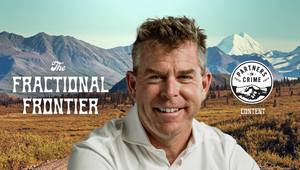
The ‘New Way of Working’ Needs a New Way of Working

Photo credit: Dall-E
These five words: A New Way of Working
If you spend any amount of time scrolling through LinkedIn or browsing industry magazines, you won’t be able to escape them. Sometimes they’re blaring out at you in flashing neon lights, other times they’re like someone in a Zoom meeting with their camera off—you know they’re there, but for some reason they don’t want you to see them.
As 2023 kicks into gear, our industry-wide conversation on this topic has lasted so long that the ‘new’ reads like a cruel inside joke. But the reason it’s dragging on is because so much of it has been reactionary and even more of it has been smoke and mirrors. The truth is that most agencies have built their ‘new way of working’ in response to the short, sharp shocks of the pandemic rather than the desire to truly find a better way forward.
Just as a thought experiment, imagine the industry’s slate was wiped clean today. No more big established names. No more holding companies. Everything has to be rebuilt from the ground up. If that were to happen, the successful agencies of the future would be assembled around the needs and wants of the marketplace which consists of two major players: brands and the people who do the work. Interestingly enough, they both want the same things: meaningful work and flexibility. The old way of working is set up to give you one or the other, but never both.
That’s why when the big agencies talk about ‘the new way of working’ it amounts to little more than window dressing. They desperately want and need to be seen as adapting to the needs of the marketplace, but the reality is that they simply can’t. There’s no money in it for them. So, they’ve come up with some clever band-aids, but the real change isn’t there.
So, what does a genuinely new way of working look like? A good starting point is a reminder of why we’re even having this conversation in the first place: Because we want to come up with great ideas and make great work. Work that’s impactful and engaging - work that’s difficult, but gratifying, to make. That’s nothing new. What is new is the disclaimer that now comes along with it: *And we also want to live great lives. It’s maddeningly ironic that the industry that invented the disclaimer and lives by the asterisk has absolutely zero ability to read the fine print at the bottom of the page.
This isn’t a conversation about office politics, or a memo for the HR team. It’s a discussion about how we might produce the best creative work and do a better job of retaining the people who do it. The kind of work that gets our blood pumping and delivers results for our clients while at the same time not ruining the lives of the people who are trying to get it done.
When we centre the conversation around that objective, a path forward becomes a great deal clearer. It comes back once again to the core desires of the marketplace: Meaningful work and flexibility. From the bottom up, there’s a growing demand for a flexible lifestyle on the part of creatives, and there’s no reason the industry shouldn’t cater to that. It’s little surprise that we’re concerned about the quality of our work when so many of the people making it are burnt out by the heavy workloads and traumatised by the frequent lay-offs.
Higher up the corporate ladder, the traditional agency structure makes a lot less sense when you consider the slow death of the retainer. More flexible working relationships are everywhere, with agency (and production) partners now more likely to be recruited for a specific area of expertise rather than an inflexible and expensive AOR contract. We should be restructuring our industry to thrive in this new reality, not merely coping with it and begrudgingly referring to it as “a new way of working”. Again, it’s about grappling with the root of the problem as opposed to haphazardly hacking off another branch.
The good news is that we can do so much better, and many of us already are. The future is flexible, scalable and about better aligning the value of our services with the needs of our clients and our processes with the needs of the people who do the work. Which, by the way, inherently becomes more meaningful because instead of wasting our time, money and energy trying to cram the round peg of industry tradition into a square hole of reality, we embrace flexibility and create a real solution that’s a better fit for everyone.
Stephen Goldblatt is the founder of Partners in Crime, a creative syndicate built on a global network of independent creatives, strategists, and production partners.












